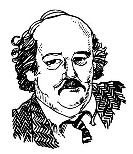(Syndicated to Kansas newspapers April 14, 2014)
 While most Kansans with real lives are wondering whether the lawnmower will start this year, a bunch of us Statehouse habitués will be waiting to see what is happening to the Kansas tax base.
While most Kansans with real lives are wondering whether the lawnmower will start this year, a bunch of us Statehouse habitués will be waiting to see what is happening to the Kansas tax base.
It’s called the Consensus Revenue Estimate, and it will be released later this week and will predict just what the state is going to have in the way of tax income for the rest of this fiscal year—that’s until July 1—and for the next fiscal year which we’ve cleverly named Fiscal Year 2015.
The CRE, as we call it, is compiled by the state’s fiscal experts with some university help, and it will become the marker for figuring how much the state has to spend.
Now, there’s no doubt that the state will have enough money to pay the bills that come due before July 1. The question is going to be how much money will be available for the next year, and that’s tricky.
Gov. Sam Brownback, who had to swallow more income tax cuts than he was hoping for last year, knows that the tax cuts mean less state revenue for, well, everything the state spends money on or hands over to local units of government and schools for them to spend.
The concept was that if Kansans paid less income tax, they’ll spend that money on other things that are subject to state taxes, ranging from the sales tax to liquor and cigarette taxes.
But you never know the trends in spending and what that means to state revenues until the CRE looks at the tea leaves and makes the estimate on which the governor and the Legislature base spending decisions.
Is there an indication that Kansans are taking that income tax money they’re saving and buying stuff? Or are the businesses that are now largely tax-free hiring workers who will pay income taxes and all?
Or, is it just too soon to tell? Has everyone adjusted their income tax withholding to account for lower tax rates, and are those businesses which aren’t paying state income tax anymore expanding or are their owners just pocketing the money?
Or…did the massive income tax cuts actually put more money in Kansans pockets, but with the recession just over and the national economy not very healthy, are Kansans just afraid to spend it on those items that come with a “consumption” tax?
Because the fiscal experts who make the estimate are tied into many areas of the economy they’ll be studying whether airplane sales are rising or whether there is enough rain for healthy crops or whether livestock diseases are likely to pare output—or increase prices, or both.
Yes, we’ll get the best estimates of what state revenues are going to be for the end of this fiscal year and the predictions for the upcoming new fiscal year; there may well be more than just numbers to be read.
There may be a peek at whether the massive tax cuts are working.
